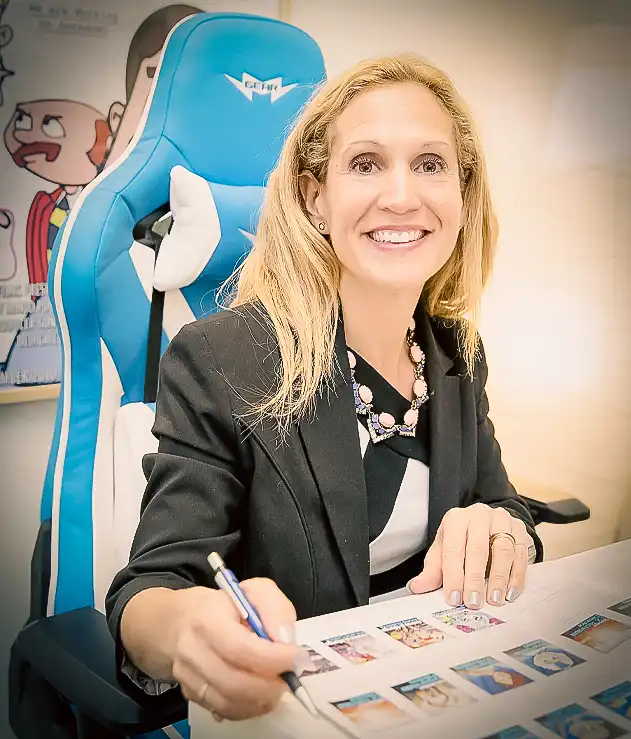 Image by: Gnepphoto, Motion Array
Image by: Gnepphoto, Motion Array
Guide to Building a Career in VFX
Visual effects play a crucial role in modern filmmaking, television, and digital media, bringing imaginative worlds and fantastical creatures to life. Whether it's creating mind-bending illusions, jaw-dropping explosions, or breathtaking landscapes, VFX artists are the masterminds behind the magic.
In this comprehensive guide, we will take you on a journey into the exciting world of VFX and provide valuable insights on how to kickstart your career in this dynamic field. From studying VFX at VANAS to becoming an effects animator and mastering the art of visual storytelling, we have all the information you need to succeed.
Key Takeaways:
- Gain a solid understanding of the VFX industry and its role in enhancing visual storytelling
- Explore the benefits of studying VFX at VANAS and the opportunities available for aspiring VFX artists
- Learn about the role of an effects animator and the career paths in the VFX industry
- Delve into the technical and artistic aspects of mastering VFX, including CGI, animation, and post-production
- Create a strong portfolio and learn effective networking strategies to advance your career in VFX
Understanding the VFX Industry
Embarking on a career in VFX requires a solid understanding of the industry. In this section, we will introduce you to the various aspects of the VFX industry, including the use of computer-generated imagery (CGI) and special effects in films, television, and other media.
VFX, short for visual effects, plays a crucial role in enhancing visual storytelling and bringing imaginative worlds to life. Through the artistry and technical expertise of VFX professionals, captivating visuals and mind-blowing effects are seamlessly integrated into live-action footage, creating immersive cinematic experiences.
Visual effects are the magic behind some of your favorite films and TV shows. They transport audiences to fantastical realms, make superheroes fly, and bring dinosaurs back to life.
The use of computer-generated imagery (CGI) allows VFX artists to create realistic and fantastical elements that interact with live-action footage. From breathtaking landscapes to larger-than-life creatures, CGI opens up a world of creative possibilities in the VFX industry.
Special effects, on the other hand, involve practical techniques and physical elements to create illusions on set. They include pyrotechnics, prosthetics, animatronics, and other practical effects that enhance the visual impact of a scene.
By understanding the intricacies of VFX, you will gain insight into the immense potential of the industry and the limitless opportunities available for creative expression. Whether you dream of working on blockbuster films, top-notch television series, or groundbreaking advertisements, the world of VFX holds an exciting future for aspiring artists.
Studying Visual Effects at VANAS
VANAS (Vancouver Animation School) offers aspiring VFX artists comprehensive programs designed to prepare them for success in the industry. When you choose to study VFX at VANAS, you gain access to experienced instructors, cutting-edge technology, and a supportive learning environment.
One of the key benefits of studying VFX at VANAS is the expertise of our instructors. They bring years of industry experience to the classroom, equipping you with practical knowledge and valuable insights. They are passionate about nurturing your talent and guiding you towards becoming a proficient visual effects artist capable of creating stunning visuals.
At VANAS, we believe in providing our students with the tools they need to excel. Our programs offer hands-on training opportunities that allow you to apply what you've learned in a real-world setting. Through practical projects and assignments, you will develop the skills necessary to bring your creative visions to life.
Moreover, our state-of-the-art technology ensures that you stay up-to-date with the latest industry standards. You will learn how to leverage industry-leading software and techniques to produce high-quality visual effects. With our industry connections and collaborations, you'll have access to the resources needed to stay at the forefront of VFX innovation.
Another advantage of studying at VANAS is the supportive learning environment we foster. Our small class sizes enable personalized attention from instructors, creating a nurturing atmosphere that promotes growth and development. You'll have the opportunity to collaborate with fellow students, learning from each other's experiences and sharing ideas.
By choosing VANAS for your VFX education, you are joining a community of passionate artists and industry professionals. Our alumni have gone on to work on major films, television shows, and gaming projects, showcasing the capabilities of a VANAS education. Start your journey towards a successful career in visual effects by studying at VANAS.
Becoming an Effects Animator at VANAS
As an effects animator, you have the power to create awe-inspiring visual effects that captivate audiences. By mastering the art of VFX, you can bring imagination to life and play a crucial role in storytelling.
At VANAS, we understand the importance of technical proficiency and artistic vision in this field. Our comprehensive programs are designed to provide aspiring effects animators like you with the necessary skills and knowledge to excel in the VFX industry.
When you choose VANAS, you gain access to experienced instructors who are passionate about sharing their expertise. Through hands-on training and cutting-edge technology, you will develop the technical skills needed to create stunning visual effects.
As you progress through your studies, you'll have the opportunity to explore various career paths in the industry. Effects animators can find exciting opportunities in film, television, gaming, and advertising industries.
Whether you dream of working on big-budget Hollywood blockbusters, creating immersive video game experiences, or designing visually stunning commercials, VANAS equips you with the skills and industry knowledge to pursue your passion.
Get one step closer to becoming an effects animator by joining VANAS. Start your creative journey today and unlock a world of possibilities in the VFX industry.
Mastering the Art of VFX
Delve into the technical and artistic aspects of mastering VFX. To create breathtaking visual effects, it is essential to learn various techniques and utilize specialized software. Fully understanding CGI, animation, and post-production processes will empower you to seamlessly integrate visual effects into live-action footage and bring your imagination to life.
Developing your skills in compositing, lighting, and texturing is crucial for producing stunning visual sequences. Compositing allows you to combine multiple elements, such as live-action footage, digital effects, and CGI, to create a cohesive and visually striking scene. Skillful lighting enhances the realism and mood of your visual effects, highlighting the important elements and creating depth. Texturing adds intricate details and surfaces to an object, making it more lifelike and believable, whether it's a fantastical creature or a futuristic cityscape.
Mastering VFX requires a hybrid of technical proficiency and artistic vision.
As you embark on your VFX journey, immerse yourself in various software tools commonly used in the industry, such as Autodesk Maya, Adobe After Effects, and Nuke. Becoming proficient in these applications will enable you to manipulate and refine your visual effects and create the desired impact. Stay updated with the latest advancements in VFX software and techniques to stay at the forefront of the industry and continuously enhance your skills.
Remember, mastering VFX is a combination of technical expertise and creative exploration. Practice, experiment, and unleash your imagination to create awe-inspiring visual effects that captivate audiences and leave a lasting impression.
Building a Strong Portfolio
A strong portfolio is a crucial tool for showcasing your talent and attracting potential employers in the VFX industry. When curating your portfolio, it's important to include key elements that highlight your strengths and expertise in visual effects, special effects, and CGI.
A well-crafted portfolio is key to standing out in the competitive VFX industry. It's your opportunity to demonstrate your technical skillset and artistic flair to industry professionals.
Start by selecting your best work that exemplifies your proficiency in creating visual effects. Include a variety of projects that showcase your versatility, from dynamic action sequences to mesmerizing fantasy worlds.
When creating special effects showcases, highlight your ability to seamlessly integrate effects into live-action footage, making them look realistic and natural. Showcasing your proficiency in CGI is equally important, as it is widely used in the industry to create stunning visual elements.
Your portfolio should tell a story of your creative journey and capture the attention of potential employers. It's an opportunity to demonstrate your unique vision and problem-solving abilities.
In addition to technical skills, consider the storytelling aspect of your portfolio. Showcase your ability to contribute to the narrative through your visual effects, bringing the director's vision to life.
Collaboration is a crucial aspect of the VFX industry, so emphasize any team projects or collaborations that you've been a part of. This demonstrates your ability to work well in a team and contribute to the overall production.
When presenting your portfolio to industry professionals, consider creating an online platform that showcases your work in an organized and visually appealing manner. Keep your portfolio up-to-date with your latest projects and continue refining it as you grow and develop as a VFX artist.
By building a strong portfolio that effectively showcases your technical skills, artistic abilities, and collaborative nature, you will stand out to potential employers in the VFX industry and increase your chances of landing your dream job.
Networking and Professional Development
Building a strong network and staying up-to-date with the latest trends and advancements in the VFX industry are vital for your career growth. In the highly competitive world of VFX, networking with industry professionals can open doors to exciting opportunities and collaborations.
One effective way to connect with industry experts is by attending events, such as conferences, workshops, and forums. These gatherings offer a platform for networking with like-minded professionals, sharing knowledge, and gaining valuable insights into the industry's current landscape. Keep an eye out for industry-specific events that focus on VFX and related disciplines. These events often feature guest speakers who are renowned experts in their fields, providing a wealth of knowledge and inspiration.
Networking is not just about making connections; it's about forming lasting relationships that can offer support and mentorship throughout your career.
In addition to physical events, online communities and social platforms play a significant role in connecting VFX professionals. Joining industry forums and groups allows you to engage with a wider community of artists, animators, and technicians who share your passion for visual effects. Participate in discussions, ask questions, and seek advice from experienced professionals. By actively participating in these online communities, you can establish valuable connections and stay up-to-date with the latest industry trends and techniques.
Professional development is also a crucial aspect of your VFX career. As technology and industry practices evolve, it's essential to continuously upskill and expand your knowledge. Attend workshops and training programs that focus on specific aspects of VFX, such as new software releases or emerging trends. These programs not only enhance your technical skills but also demonstrate your commitment to professional growth.
Conferences and industry-specific events often feature informative sessions and panel discussions led by industry leaders and experts. Take advantage of these opportunities to gain valuable insights and learn from the best in the field. These events also provide a platform to showcase your work and receive feedback from industry professionals.
Continuous learning is the key to staying ahead in the ever-evolving world of VFX. Embrace every opportunity for growth and be curious about new techniques and technologies.
By actively networking and investing in your professional development, you can position yourself as a dedicated and knowledgeable professional in the VFX industry. Remember, the connections you make and the skills you acquire can greatly contribute to your success in this competitive field.
Launching Your Career in VFX
As you near the end of this comprehensive guide to building a career in VFX, it's time to explore the practical steps to launch your journey in the world of visual effects. The VFX industry offers a plethora of exciting job opportunities that cater to your passion for creating stunning visual spectacles.
From film studios to gaming companies, animation studios to post-production houses, there's a diverse range of avenues waiting for talented individuals like you. These organizations are on the lookout for professionals who possess the right skills and qualities to bring their imaginative visions to life.
So, what are some of the key skills and qualities employers seek in VFX professionals? A strong foundation in visual effects, coupled with a keen eye for detail and creativity, is highly valued. Employers also appreciate professionals who are well-versed in the latest VFX software and have a strong understanding of visual storytelling.
To secure your first job in the field of VFX, it's essential to showcase your talent and expertise through a compelling portfolio. Highlighting your best work, including special effects and visually captivating CGI showcases, will make you stand out to potential employers.
Remember, the journey to a successful VFX career starts with building a solid foundation in VFX, honing your skills, and networking with like-minded professionals. With determination, passion, and a commitment to continuous learning, you can embark on a fulfilling career in the ever-evolving world of visual effects.
FAQ
Can I pursue a career in VFX without formal education?
While formal education can provide you with a solid foundation and the necessary tools to excel in the VFX industry, it is not always a requirement. Many VFX professionals have successfully built their careers through self-study, online courses, and practical experience. However, pursuing a specialized VFX program, such as those offered at VANAS, can greatly enhance your knowledge, skills, and job prospects in the industry.
What software is commonly used in the VFX industry?
The VFX industry relies on a variety of software to create stunning visual effects. Some common software used by VFX professionals include Autodesk Maya, Adobe After Effects, Nuke, Houdini, and Cinema 4D. Familiarizing yourself with these software programs and staying updated with the latest versions and features can greatly benefit your VFX career.
What job opportunities are available in the VFX industry?
The VFX industry offers a wide range of job opportunities for aspiring professionals. Some common roles include VFX artists, effects animators, compositors, 3D modelers, texture artists, and motion graphics designers. These roles can be found in film and television studios, animation studios, advertising agencies, gaming companies, and post-production houses.
How important is networking in the VFX industry?
Networking plays a crucial role in the VFX industry. Building connections with industry professionals, attending industry events, and joining online communities can open doors to job opportunities and collaborations. Networking allows you to learn from others, gain valuable insights, and stay updated with the latest trends and advancements in the field.
How can I build a strong VFX portfolio?
Building a strong VFX portfolio is essential for showcasing your skills and attracting potential employers. Focus on including a diverse range of projects that highlight your technical proficiency and artistic vision. Include examples of both personal projects and professional work if available. Consider creating breakdowns and demonstrating your creative process to give employers an insight into your workflow and problem-solving abilities.
What are the qualities employers look for in VFX professionals?
Employers in the VFX industry often look for a combination of technical skills, creativity, attention to detail, teamwork, and problem-solving abilities. Additionally, having a strong work ethic, adaptability to new software and techniques, and a passion for visual storytelling can make you a valuable asset to any VFX team.
How can I stay updated with the latest trends and advancements in the VFX industry?
Staying updated with the latest trends and advancements in the VFX industry is essential for career growth. Follow industry-leading websites and blogs, join online VFX communities, and attend industry events and conferences. Additionally, keeping up with the latest software updates and learning new techniques through online tutorials or workshops can help you stay at the forefront of the industry.
How do I land my first job in the VFX industry?
Landing your first job in the VFX industry requires a combination of technical skills, a strong portfolio, and effective networking. Start by curating an impressive portfolio that showcases your abilities. Network with industry professionals through events, online platforms, and social media. Stay persistent, apply to relevant job openings, and consider internships or freelance opportunities to gain practical experience and make valuable connections.







